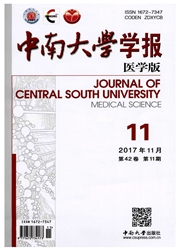

 中文摘要:
中文摘要:
目的:探讨热休克因子1(heat shock factor1,HSF1)对热应激所致Raw264.7巨噬细胞凋亡的影响。方法:采用热应激(42.5℃±0.5℃)处理稳定表达小鼠HSF1基因的Raw264.7巨噬细胞1h,37℃分别恢复6,9,12,24h,采用流式细胞术,hoechst33258染色和DNA琼脂糖凝胶电泳检测细胞凋亡。结果:流式细胞术结果显示,热应激后对照组(转空载体)细胞凋亡核百分率较热应激前明显升高,9h达峰值(约为60%),此时荧光染色可见30%的细胞出现核固缩,凋亡小体等典型的凋亡形态学改变;并于热应激后6,9,12h均能检测到清晰的DNA梯状条带。与转空载体对照组相比,HSF1过表达能显著降低热应激所致凋亡及明显抑制DNA的断裂。结论:HSF1可以抑制热应激所致的Raw264.7巨噬细胞凋亡。
 英文摘要:
英文摘要:
Objective To observe the effect of heat shock factor 1 ( HSF1 ) on heat stress-induced apoptosis in Raw264.7 macrophages. Methods Raw264.7 cells transfected with pcDNA3. 1 and pcDNA3. 1-HSF1 were exposed to heat stress (42.5 ℃ ±0.5 ℃ ) for 1 h and recovered at 37 ℃ for 6, 9, 12, and 24 h respectively. Flow cytometry (FCM) , Hoechst 33258 staining and DNA ladder assays were performed to assess the apoptosis. Results After heat stress, FCM showed that apoptotic cells were increased significantly and reached the peak at 9 h in Raw 264. 7 cells transfected with pcDNA3. 1 , and were characterized with classical morphologic changes including apoptotic body and nuclear condensation. Agarose gel electrophoresis showed that " DNA ladder" could be observed clearly at 6, 9, and 12 h after the heat stress. But the overexpression of HSF1 could reduce the number of apoptotic cells and inhibit DNA fragmentation. Conclusion HSF1 can inhibit heat stress-induced apoptosis in Raw264.7 macrophages.
 同期刊论文项目
同期刊论文项目
 同项目期刊论文
同项目期刊论文
 期刊信息
期刊信息
